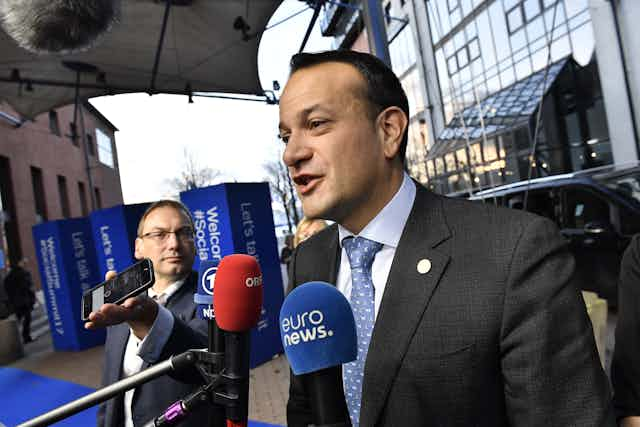Ireland may have narrowly avoided a snap December election, but the future of taoiseach Leo Varadkar’s minority government remains in question. At a critical point in the Brexit talks, a political crisis involving a whistle-blower scandal looked set to take down the Irish government, before being averted by the last minute resignation of tánaiste (deputy prime minister) Frances Fitzgerald.
The Irish government’s confidence and supply arrangement with main opposition party Fianna Fáil survives for now, but a general election in 2018 is far from off the table.
The timing could hardly be worse. Ireland has emerged as a major player in Brexit negotiations. Key Irish political figures, including its European commissioner, have indicated that Ireland is prepared to veto Britain’s progression to the second stage of negotiations if sufficient progress is not made on a plan for what happens to the border between Ireland and Northern Ireland after Brexit.
Some think such political turmoil could be a gift to those rooting for the Irish to “shut their gobs” about their Brexit concerns or even pay for a border to be constructed. The hope is that chaos in Dublin would distract or divide Irish leaders, leaving less time for them to ask difficult questions about the intractable border question.
But Ireland’s difficulties are not necessarily Britain’s opportunity. Political parties in Ireland may be divided but they remain united on Brexit. An election in 2018 could cause delays and a loss of political capital but it will not result in an Irish government with a different position on Brexit. The view from TDs (Irish MPs) across political divides is that the Irish position on Brexit can’t be about party politics, it has to be about national interest. Without exception, the drivers of the Irish party positions are the border issue, protecting the peace process, trade and economic prosperity.
Irish parties are even united on the specifics. Calls for Northern Ireland to have some kind of special status rankled with many in Britain – and some have bizarrely speculated that republican pressure is forcing Fine Gael to push harder for such an arrangement – but this is actually a policy which predates Varadkar. It has had cross-party support for some time.
Fine Gael wants a written guarantee from Britain that there won’t be a hard border after Brexit. Fianna Fáil has similarly made it clear that the customs border between Ireland and the UK should be in the Irish Sea. The Irish Labour party also supports special status for the North. All three parties stop short of Sinn Féin’s specific insistence that Northern Ireland remain in the EU but the broad vision is the same – Northern Ireland needs a specific arrangement.

There is similar cross-party support for the argument that a “technical solution” to the Irish border with Northern Ireland is a non-starter. The idea favoured by Whitehall of using cameras and some kind of online customs border was dismissed as early as June 2017 by Fine Gael. Sinn Féin has derided such proposals as “naive and unworkable”. Fianna Fáil’s official position is to object to “any border… either physical or electronic”.
Naturally, Irish parties have found some room for disagreement on Brexit. Most are highly critical of Sinn Féin’s role in collapsing power-sharing in Northern Ireland. Fianna Fáil and Sinn Féin have criticised Fine Gael’s domestic economic preparation for Brexit, and Sinn Féin has also criticised other parties for playing with language on the term “special status”. These differences matter, but don’t translate into a meaningful divergence on the national position.
A strengthened hand?
What’s more, a 2018 election is likely to be at least partially fought on which party has strongest position on Brexit and the border. Any new government would have a mandate to be much more stubborn than the current administration has been in its dealings with Britain.
Finally, the EU27 are united on Ireland’s evaluation of Britain’s progress. The EU has already accused Britain of “magical thinking” over its border plans. While a snap election still looked likely, EU negotiator Michel Barnier tweeted a reaffirmation that “Irish issues are EU issues”. The EU26 are likely to take Ireland’s lead on the border issue, and although Ireland has a veto, at the moment, “complete solidarity” with Ireland’s position means it probably won’t need to use it.
Ireland has narrowly and fortunately avoided a collapse in its government which could have undermined the crucial upcoming European Council meeting. But even if there is a surprise election on the horizon, Irish political parties are unified on their response to Brexit. The British government needs real, concrete detail on its plans for a frictionless border for Northern Ireland. Ireland’s position is not going to change any time soon.

